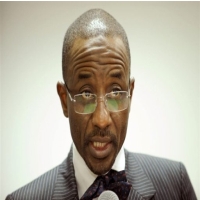 Nigeria’s outspoken central bank governor, has called for a criminal investigation into a multi-billion dollar fuel subsidy fraud. Lamido Sanusi said those responsible should not only pay back stolen funds but go to jail.
Nigeria’s outspoken central bank governor, has called for a criminal investigation into a multi-billion dollar fuel subsidy fraud. Lamido Sanusi said those responsible should not only pay back stolen funds but go to jail.
“No one can ignore these findings. We should have proper investigations,” Lamido Sanusi told the Financial Times in London.
Mr Sanusi instigated a far-reaching clean-up of the banking sector following its crash in 2009. More than $1bn in assets were recovered from one bank, Oceanic, whose former CEO also served a short, but unprecedented, jail sentence for fraud.
Mr Sanusi told the FT in an interview that similar efforts to recover ill-gotten assets should be undertaken as part of a clean-up of the fuel subsidy. He added that he knew of one company that had acquired assets in the US with the proceeds.
“People who are established to have been involved in a fraud should not just pay back the money, they should go to jail. If we don’t do that we cannot ask people to pay more for fuel . . . There is a strong moral and political argument on the need to hold people to account,” he said.
The House of Representatives Ad-hoc committee that investigated the implementation of the subsidy regime in the country, found that Mismanagement and theft by top Nigerian officials involved in a corrupt fuel subsidy scheme cost the country I trillion Naira or $6.8 billion in three years, and called on President Goodluck Jonathan to overhaul the state oil firm and ministry.
The report adopted today by the entire house recommended that the sum of N1,067,040,456,171.31 be refunded to the Federation Account by the Nigerian National Petroleum Corporation, marketers, companies that refused to appear before the committee as well as the Petroleum Product Pricing and Regulatory Agency.
The report was compiled by a committee set up after nationwide protests forced the government to compromise on an attempt to withdraw the subsidy in January. It vindicates government critics who had argued that unchecked corruption, not rising demand for fuel, had caused the cost of the subsidy to more than double to $16bn in 2011.
The lifting of the subsidy in January forced the price of transport and food to rocket, hitting Nigeria’s poorest in the pocket. But the nationwide outburst was also sparked because of the perception that some of the people who abused the subsidy programme for personal gain were forcing the public to pay the cost.
Mr Sanusi said the rationale for lifting the subsidy remained. Even though it has been halved it will still cost more than the government has budgeted for this year if oil prices remain at current highs.
The governor added that the case for lifting the subsidy was based on more than cost. “If we are going to remove fuel subsidies completely we must have a moral basis for doing so as well,” he said
Asked whether the political system could tolerate a criminal investigation likely to end up accusing high-level officials, he said:
“We can’t continue like this. What we did in banking has got to happen in other sectors. We have got to do it in oil, we have got to do it in power. We have to do it across government. If you don’t do it then you stand a big risk that the political system will not survive.”
previous post
